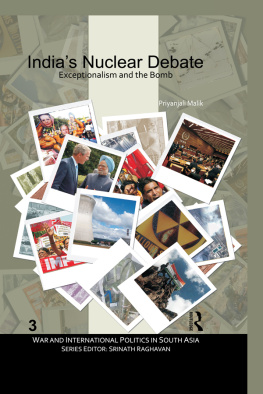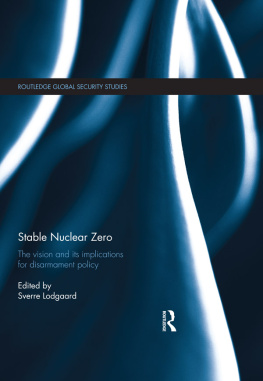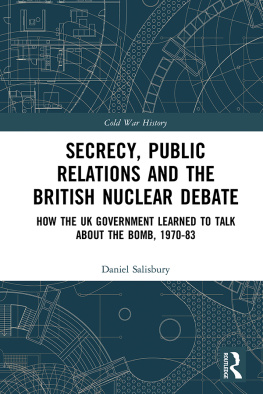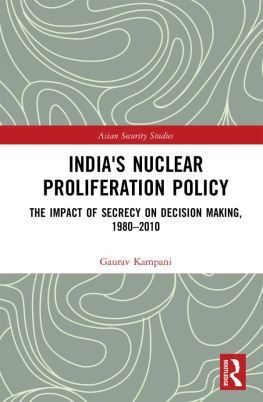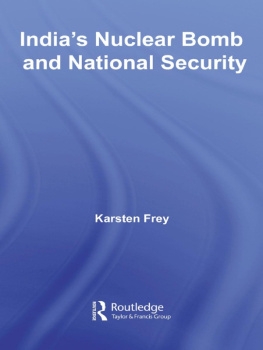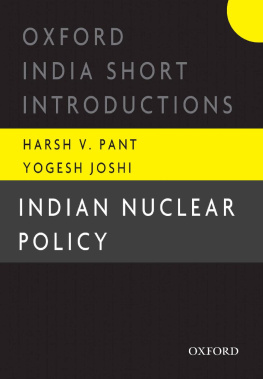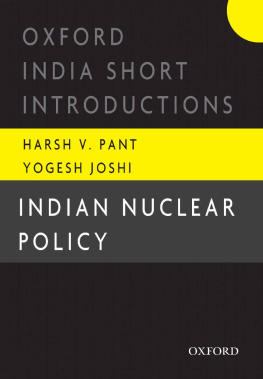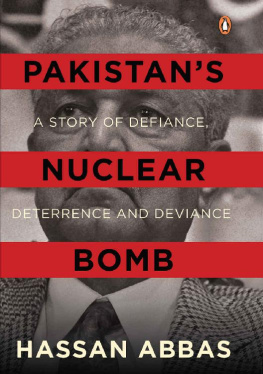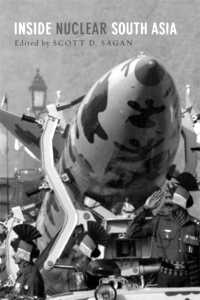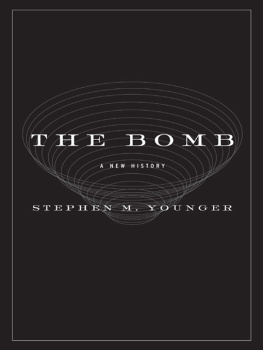Indias Nuclear Debate
Series Note
War and International Politics in South Asia
Series Editor: Srinath Raghavan
Senior Fellow, Centre for Policy Research, and Lecturer in Defence Studies, Kings College London,
University of London.
This Series seeks to foster original and rigorous scholarship on the dynamics of war and international politics in South Asia. Following Clausewitz, war is understood as both a political and a social phenomenon which manifests itself in a variety of forms ranging from total wars to armed insurrections. International politics is closely intertwined with it, for war not only plays an important role in the formation of an international order but also a threat to its continued existence. The Series will therefore focus on the international as well as domestic dimensions of war and security in South Asia. Comparative studies with other geographical areas are also of interest.
A fundamental premise of this Series is that we cannot do justice to the complexities of war by studying it from any single, privileged academic standpoint; the phenomenon is best explained in a multidisciplinary framework. The Series welcomes a wide array of approaches, paradigms and methodologies, and is interested in historical, theoretical, and policy-oriented scholarship. In addition to monographs, the Series will from time to time publish collections of essays.
Also in this Series
Fighting Like a Guerrilla: The Indian Army and Counterinsurgency
Rajesh Rajagopalan
ISBN 978-0-415-45684-5
Indian Foreign Policy in a Unipolar World
Editor: Harsh V. Pant
ISBN 978-0-415-48004-8
First published 2010
by Routledge
912915 Tolstoy House, 1517 Tolstoy Marg, New Delhi 110 001
Simultaneously published in the UK
by Routledge
2 Park Square, Milton Park, Abingdon, Oxon, OX14 4RN
Routledge is an imprint of the Taylor & Francis Group, an informa business
Transferred to Digital Printing 2010
2010 Priyanjali Malik
Typeset by
Star Compugraphics Private Limited
D156, Second Floor
Sector 7, Noida 201 301
All rights reserved. No part of this book may be reproduced or utilised in any form or by any electronic, mechanical or other means, now known or hereafter invented, including photocopying and recording, or in any information storage and retrieval system without permission in writing from the publishers.
British Library Cataloguing-in-Publication Data
A catalogue record of this book is available from the British Library
ISBN: 978-0-415-56312-3
This project started out as a cloud of incoherent ideas as I wandered about the University Parks in Oxford, trying desperately to come up with a viable research project for my DPhil thesis. It probably would have stayed that way but for the help, guidance, encouragement and patience of several people, only some of whom are mentioned here. First of all, a huge thank you to my supervisors, Professors Judith Brown and Henry Shue. They agreed to take me under their wing despite their numerous other commitments when I found myself suddenly supervisorless at the end of my first year. Professor Brown immediately imposed some structure on my ramblings and helped me tease out a coherent story. Both she and Professor Shue were unfailing in their patience (and good humour) along the long and winding road to the finish line as I produced first a fianc, then a wedding and finally a baby to keep me distracted.
My thanks also to Professors Sir Adam Roberts, Avi Shlaim and Andrew Hurrell for bridging the gap between academic advisors and mentors to become family. All three played a big role in getting me to Oxford and keeping me there. Dr Yuen Foong Khong always had a smile and words of encouragement to help me along the way. Oxford, in general, was a wonderful place to park myself, and the Ian Taylor Scholarship that Merton College offered me freed me from the tedious anxieties of worrying about where my next meal might arrive from, allowing me to concentrate on my work instead. Beyond the dreaming spires, Dr Rahul Roy-Chaudhury at the International Institute for Strategic Studies (IISS) listened to endless versions of my thesis and still managed to sound enthusiastic about it. Dr W.P.S. Sidhu may have had to suffer fewer iterations only by virtue of not being in the same country as me, but he willingly read portions of my thesis at very short notice and sent me thoughtful and detailed comments on my work. The IISS library has been wonderfully patient in letting me have several books out on a disgracefully long loan.
Finally out of Oxford, Sir Jeremy and Lady Greenstock welcomed me and the thesis into the Ditchley family after I (allegedly) turned Sir Jeremys previously capable deputy to mush. My thanks also for being most understanding of (and probably amused by) my inability to sit quietly as an observer at the back of the room at all the conferences I was privileged to attend.
I was very lucky to have Professor Kanti Bajpai as my external examiner. His thoughtful comments are reflected in the final manuscript, though what may be less evident but no less important is the encouragement that I received from him throughout the time I was researching my thesis. Several people were extremely generous with their time, gently challenging my ideas while imparting new information. Of them, Lieutenant General V.R. Raghavan was perhaps the most indulgent, patiently hearing me out on several occasions over the course of the three years of my research. Dr Rajesh Rajagopalan invited me to speak at a seminar at the Centre for International Politics, Organization and Disarmament (CIPOD), Jawaharlal Nehru University (JNU), which was extremely useful in testing out my thesis as I was about to wrap up. A big thank-you as well to Joshua Huminski, who was wonderful in double-checking some facts and ferreting out new information at very short notice as I scrambled to finish the manuscript.
Dr Nilanjan Sarkar at Routledge and the Commissioning Editor of this series, Dr Srinath Raghavan, have been incredibly patient in the long wait for this manuscript. Srinath, especially, has been very accommodating and cheerful as life kept overtaking my thesis and pushing it further and further down the road.
After the initial trauma of dealing with the possibility that I might remain a student for the rest of my life, my parents have been amazingly enthusiastic and supportive of this whole venture, even politely reading various bad drafts when they were sent their way. It was of course understood that they would help set up interviews, look out for (and make!) newspaper clippings and not ask too many questions about why the thesis wasnt finished when I said it would be. My mother-in-law helped me cross that final mile by baby-sitting her very energetic granddaughter while I desperately turned the thesis into a book.
My husband, Ashish Bhatt, probably didnt realise that he was marrying my thesis as well as me. Luckily, this double commitment does not seem to have scarred him too badly. He has had to suffer this project from the day we met and, if he was ever bored of it, he never let on. Thank you for living and breathing this endeavour with me and for exhorting me on whenever the end seemed to fade out of sight. Our daughter, Rehmat, was most considerate in waiting for the thesis to be submitted before arriving. All in all, my growing family has helped me keep perspective when it all seemed to get a bit much. Without their unflagging enthusiasm and support, this project would probably have been finished earlier. No doubt it would have been the poorer for it. This book is dedicated to them.

